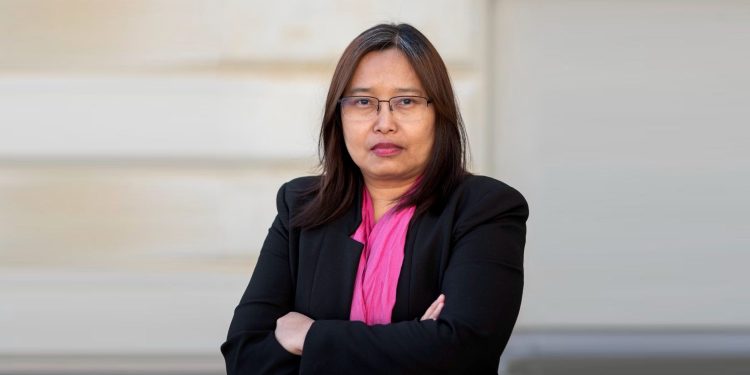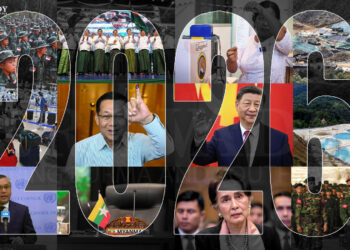Myanmar’s military regime released 402 political prisoners last week as part of its amnesty for nearly 6,000 inmates. The move was hastily embraced by the Association of Southeast Asian Nations (ASEAN) special envoy for Myanmar, who said the release was a sign of good will and an important gesture suggesting that the ruling junta is ready to change, despite the fact that Myanmar has been in turmoil since last year’s coup.
“I would like to warn the international community not to overly celebrate the prisoner release as being due to the success of their diplomacy,” said Daw Zin Mar Aung, the parallel National Unity Government’s (NUG) foreign minister. She added that releasing some political prisoners after killing over 2,500 anti-regime activists since the military takeover cannot be viewed as change.
In an interview with The Irrawaddy, Daw Zin Mar Aung explained why the world should not regard the amnesty as a positive move, what more the international community should be doing to restore democracy in Myanmar, and her suggestions to the United Nations (UN) and ASEAN envoys on Myanmar for their missions to be accomplished meaningfully.
What does the regime’s recent release of political prisoners mean to you?
As we have often said, those who were released did nothing wrong. They were detained when the coup happened as a preemptive measure by the Myanmar military to prevent them from opposing military rule. They were prosecuted on trumped-up charges before they did anything. We call it hostage diplomacy, as can also be seen with the cases of the four detained foreigners who were just released. This is the typical way military dictators react when faced with growing pressure on their regimes. The regime wants to enhance its image by releasing innocent people who it detained on trumped-up charges. The junta has released them in order to deceive the international community and to ease the pressure on the regime.
Can you elaborate more on how military dictators in Myanmar have used political prisoners as pawns in the past?
I was a political prisoner, too. I experienced the post-1988 pro-democracy uprising, the 2003 Depayin Massacre and the 2007 Saffron Revolution. When there was growing international pressure during those periods, or when international dignitaries were about to visit Myanmar, the military would release political prisoners who were just a few months away from completing their sentences. Such releases never delivered any of the political change that was necessary for the country. The current situation is testimony to that.
What is your message to people who have embraced the latest amnesty as a sign that the regime is willing to change?
ASEAN’s special envoy for Myanmar, who is also the foreign minister for Cambodia, overly celebrated the amnesty in his statement on November 17. He has a reason to celebrate because Cambodia has failed as ASEAN chair in handling the Myanmar issue since it took over the chair of ASEAN at the beginning of the year. Political prisoners including Ko Jimmy and Ko Phyo Zeyar Thaw were executed while Cambodia has served as the ASEAN chair. Those executions were the first in Myanmar for decades. About the recent prisoner release, it is just another move by the regime to deceive ASEAN again. While there is growing pressure from not only ASEAN leaders but leaders of ASEAN partner countries, the prisoner release is an achievement for Cambodia to celebrate. But how many villages has the regime torched despite the prisoner release? We need to take a look at that.
It would be very stupid to draw a conclusion based only on the prisoner release that the military regime has become more flexible. Diplomats and state leaders who have constantly monitored Myanmar issues are well aware of that. It will not take long for the rest of the world to find out if the Myanmar military is really willing to make changes or is just trying to deceive the world.
Did the junta release the political prisoners to try and change international perceptions of the regime?
Myanmar has been a headache for the international community, especially for countries in Southeast Asia, for nearly two years. They are therefore putting added pressure on the regime. So the junta has made this move to give the impression that everything is fine inside the country. Fellow ASEAN countries may feel that their burden has been eased by the prisoner release. That’s why they have made over-optimistic statements about it. But they can’t deceive themselves for long. The regime is acting arrogantly because the international community and ASEAN countries fail to put enough diplomatic pressure, not to mention other types of pressure, on the regime. If together they increase the pressure, the regime will have to make more concessions. The regime has made a small concession because of pressure from ASEAN. That doesn’t mean that the regime will back down. It has just made an obvious move in response to diplomatic pressure.
ASEAN’s envoy will visit Myanmar for the third time soon and has said that he will focus on ending violence in the country. Is that realistic?
The special envoy used the phrase ‘anti-violence’ in his statement. He also talked about ASEAN’s Five-Point Consensus and humanitarian assistance, trust building and peace dialogue. The envoy should convince Min Aung Hlaing of the need to end the violence. The regime has released political prisoners. On the other hand, it commits violence daily. The envoy should study how many villages the regime torched in Sagaing and Magwe regions last week, both before and after the prisoner release. We will wait and see if the ASEAN envoy can convince the regime to stop the violence. Is the envoy confident that he can convince Min Aung Hlaing? If the military does not stop the violence, there can’t be trust and confidence building.
ASEAN announced after its latest summit that it would engage with all stakeholders. Has ASEAN engaged with the NUG?
So far since the summit, ASEAN has not yet made any offer to engage with the NUG. We maintain regular contact with them. It is fair to assume that the regime has released political prisoners because it has concerns after the summit, specifically ASEAN’s call for engagement with all stakeholders. In fact, the Five-Point Consensus already calls for dialogue among all parties. And both the ASEAN and UN envoys have the mandate to push the Myanmar military towards dialogue. They need to continue engaging with us. We always try to engage with them. The NUG’s foreign ministry has already told ASEAN foreign ministers how we can cooperate in humanitarian assistance delivery. They have not yet responded to us. We have regular engagement with Malaysia’s foreign ministry.
Do you have any suggestions for ASEAN that might prompt meaningful change from the junta?
First, all the prisoners who were detained and prosecuted on trumped-up charges since the coup — I would call them political hostages — must be freed. Secondly, the regime must be made to stop the violence. It is the regime that started the violence without any provocation. The regime must be made to stop arrests, arson attacks on villages and assaults. ASEAN should urge the regime to follow the Five-Point Consensus. Thirdly, ASEAN must not accept the general election which the regime wants to stage. The election will contribute nothing to achieving the sustainable solution and peace dialogue that ASEAN is soliciting. ASEAN should put pressure on the regime regarding those three points.
ASEAN has leverage to further disengage with the regime by refusing its political representation at not only upcoming ASEAN Summits but also other relevant meetings. Neither ASEAN nor the international community has applied its diplomatic leverage strongly enough. Should ASEAN make a proper effort, the 15-point decision reached at the recent summit will have an impact on the regime. It appears that the 15-point decision has put added pressure on the regime, which is why political prisoners were released. ASEAN should apply further pressure to the regime.
Some countries think that an election will solve all the problems in Myanmar. Speaking of elections and democratization in Myanmar, I don’t want the international community to forget the 2020 general election. The military used the 2020 election to justify its coup, even though the international community and observers said that the poll was credible. So it is unreasonable to expect that a new election will solve the problems in Myanmar. It is daydreaming.
Any election held by the regime can’t be a political solution. We need to look for a sustained political solution. We are well aware of the root cause of the problem that has resulted in the vicious circle of coup after coup in Myanmar. We have had intense debate with ethnic minority representatives, elected lawmakers, civil society organizations and organizations involved in the Spring Revolution for a year, and we reached a consensus which is the Federal Democracy Charter. We agree to hold an election and find political solutions based on that charter. We will continue to fight to put the country on that political path. And we will articulate to the international community that we already have the political path that will provide practical solutions to end the political problems of the country. Our political path includes holding an election that is not based on the [military-drafted] 2008 Constitution.
Indonesia takes over as ASEAN chair next year. What do you expect from them?
We expect Indonesia to engage with all stakeholders and to listen to the voices of not only the military regime but Spring Revolution forces, political forces, ethnic revolutionary organizations, the Committee Representing Pyidaungsu Hluttaw and the NUG. Indonesia has relevant experience, as it has transformed itself from a military-dominated parliament to a democracy. It has experiences that can be helpful in the case of Myanmar. I think Indonesia will take a more active approach and it is trying to find a solution through discussions with not only fellow ASEAN countries but ASEAN partner countries. It has learned lessons over the past two years, while other countries were the ASEAN chair. So we expect more active engagement from them. We already have informal engagement with Indonesia.
What are your suggestions for the UN and ASEAN special envoys to Myanmar?
They need a coordinated approach instead of just meeting junta leaders. If they fail to create ahead of their visits a political or diplomatic set-up in which they can put pressure on the regime, their visits will achieve no results. Again, they can’t meet junta leaders as they want. They can only visit them when the junta leaders allow it. The UN envoy had to wait for months before she was finally granted a visa for Myanmar. They must have stronger diplomatic muscle. That they are allowed to visit Myanmar should not be their goal: they should focus on the results of their talks with the junta leaders. They do have a mandate, but they must prepare before their planned visits the entire mechanism of diplomatic power and pressure that support their mandate. Only then will there be progress. But if they view permission to visit the regime as a reward, their visit will deliver no results. Their missions will continue to fail. It is important not to be over-optimistic that the Myanmar military is willing to change while key decision makers like Daw Aung San Suu Kyi and ousted President U Win Myint remain in prison.

















